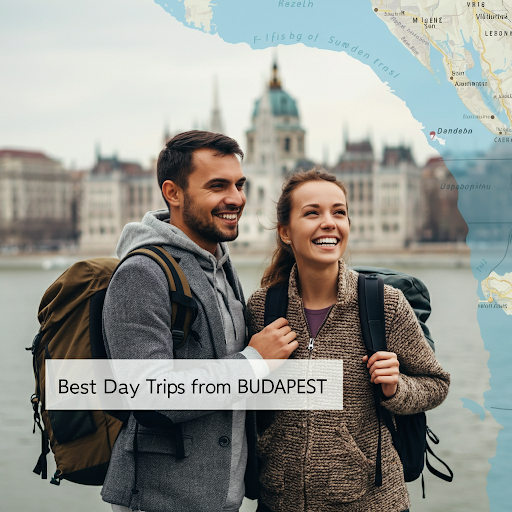
Best Day Trips from Budapest: Plus Learn Some Words for Nature and Outdoors
Share
Day Trips from Budapest: Learn Hungarian Words for Nature and Outdoors
Budapest is a beautiful city, but sometimes the bustling metropolis calls for a little escape into nature. Whether you're looking to relax by a serene lake, hike through lush forests, or explore charming towns surrounded by natural beauty, Hungary offers plenty of options for unforgettable day trips. And what better way to enhance your experience than by learning some useful Hungarian nature vocabulary along the way?
In this guide, we’ll recommend some of the best day trips from Budapest, including destinations like Lake Balaton and the Danube Bend, while teaching you Hungarian words and phrases to help you connect with nature and the outdoors.
1. Lake Balaton: Hungary’s Gorgeous “Sea”
Just a short train ride from Budapest, Lake Balaton is one of the most popular day trip destinations for locals and tourists alike. Often referred to as Hungary's "sea," this stunning freshwater lake offers scenic views, relaxing beaches, and charming towns like Balatonfüred and Tihany.
Key Hungarian Vocabulary for Lake Balaton:
- Tó (Lake)
- Part (Shore)
- Homokos (Sandy)
- Víz (Water)
- Horgászás (Fishing)
- Napernyő (Sun umbrella)
- Séta (Walk)
When you’re walking along the lake or hiking up to the Tihany Abbey, try using these words to engage with the locals. Practice saying "Sétálj a parton" (Take a walk along the shore) or "Szeretem a vízpartot" (I love the lakeside).
2. Danube Bend: Majestic Views and Charming Villages
The Danube Bend (Duna-kanyar) is a picturesque region where the mighty Danube River takes a sharp curve, offering breathtaking landscapes and charming villages like Visegrád, Esztergom, and Szentendre. It's perfect for a relaxing day surrounded by nature and history.
Key Hungarian Vocabulary for the Danube Bend:
- Folyó (River)
- Híd (Bridge)
- Völgy (Valley)
- Kilátás (View)
- Hegy (Mountain)
- Sziget (Island)
- Falu (Village)
As you explore, try practicing sentences like “A Duna partján sétafikálok” (I’m strolling along the Danube) or “Gyönyörű a kilátás a hegyekből” (The view from the mountains is beautiful).
3. Gödöllő: The Royal Palace and Peaceful Gardens
If you're looking for a mix of nature and history, the Gödöllő Palace and its sprawling gardens make for a perfect day trip. Located about 30 minutes outside of Budapest, this charming town offers a royal experience combined with lovely natural surroundings.
Key Hungarian Vocabulary for Gödöllő:
- Palota (Palace)
- Kert (Garden)
- Fák (Trees)
- Virágok (Flowers)
- Házikó (Cottage)
- Árnyék (Shade)
Learn to say “Sétálunk a palota kertjében” (We are walking in the palace garden) or “A fák alatt pihenek” (I’m resting under the trees).
4. Visegrád: Hiking and History Combined
Nestled on the banks of the Danube River, Visegrád is a historical gem with a medieval castle, the Visegrád Citadel, and stunning hiking trails that offer panoramic views of the surrounding area. Whether you're into history, hiking, or simply taking in the view, Visegrád has something for everyone.
Key Hungarian Vocabulary for Visegrád:
- Vár (Castle)
- Erődség (Fortress)
- Hegycsúcs (Mountain peak)
- Túra (Hike)
- Kilátó (Viewpoint)
- Birodalom (Empire)
Imagine saying “Felmegyünk a várhoz” (We’re going up to the castle) or “A túra csúcspontja lenyűgöző volt” (The summit of the hike was breathtaking).
5. Hortobágy National Park: Hungary’s Great Plains
For a completely different experience, head east to Hortobágy National Park, Hungary’s largest protected area, located just a few hours from Budapest. Known for its vast puszta (plain) landscapes and unique wildlife, it's an excellent destination for nature lovers and birdwatchers.
Key Hungarian Vocabulary for Hortobágy:
- Nád (Reed)
- Állat (Animal)
- Madár (Bird)
- Puszta (Plain)
- Tanya (Farm)
- Szél (Wind)
While exploring, use phrases like “Látok egy madarat a nádasban” (I see a bird in the reeds) or “A pusztán vagyunk” (We’re on the plains).
Bonus Tip: Practice Your Hungarian with Locals
When visiting these destinations, take the opportunity to practice your Hungarian! Whether you’re ordering at a café, asking for directions, or chatting with locals, using these nature-related words will enrich your travel experience and help you connect with Hungary on a deeper level.
Example Phrases to Use:
- Mennyi időbe telik ide eljutni? (How long does it take to get here?)
- Van túraútvonal a hegyekben? (Is there a hiking trail in the mountains?)
- Miért olyan szép a tó? (Why is the lake so beautiful?)
Final Thoughts
Hungary’s natural beauty is waiting for you just beyond the city limits of Budapest. Whether you're exploring the tranquil shores of Lake Balaton, the scenic wonders of the Danube Bend, or the peaceful plains of Hortobágy, learning Hungarian vocabulary related to nature will make your experience even more memorable. So, pack your bags, brush up on your Hungarian, and get ready for a nature-filled adventure in and around Budapest! Want some more tips for travel and also learn Hungarian with us? Get a free consultation with us here.
